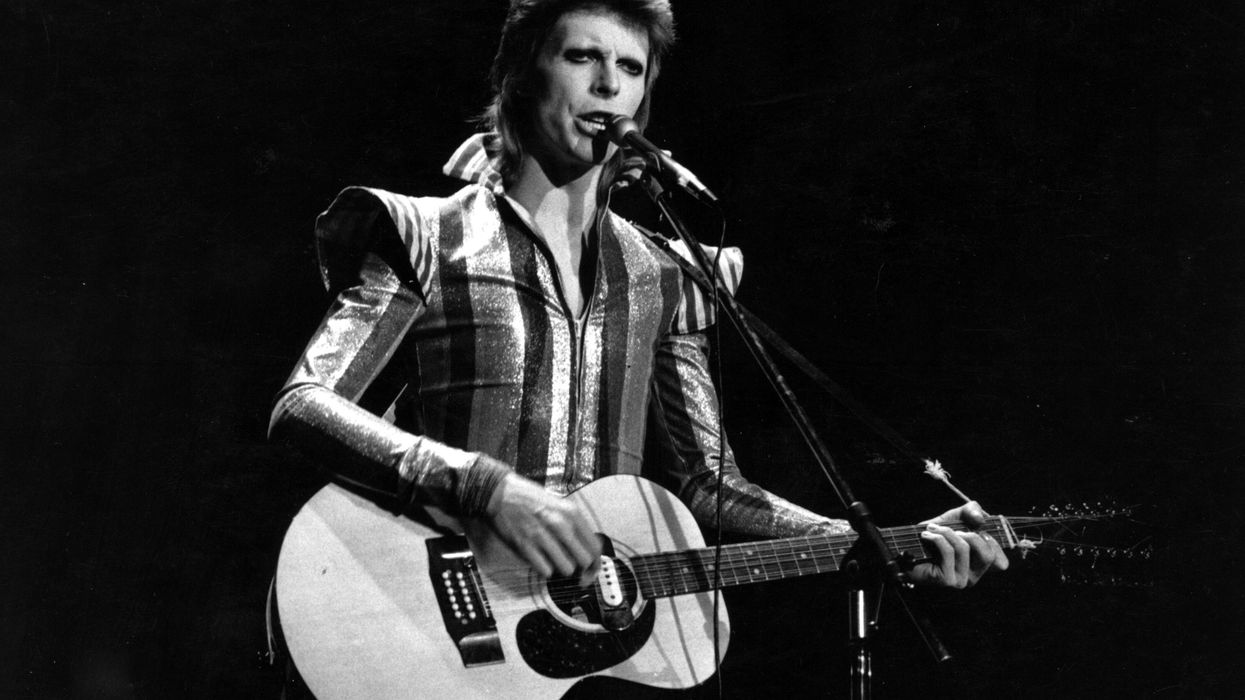Sinead Butler
Jan 08, 2022
David Bowie would have turned 75 on January 8th 2022.
Known for his flamboyant and androgynous alter ego Ziggy Stardust and later as Aladdin Sane, The Thin White Duke and The Soul Man, he sold over 100 million records during his lifetime with hits such as ‘Space Oddity’, ‘Ashes to Ashes’, ‘Under Pressure’ and ‘Let’s Dance’.
But Bowie is also noted as a forward-thinker not only in his music but how he perceived the direction the world was heading in as he seemingly managed to predict some of the elements that have become an integral part of society today.
Sign up to our new free Indy100 weekly newsletter
Here are some of David Bowie’s scarily accurate predictions of the future that actually came true:
The power of the internet and social media
Back in 1999, if you told someone the internet would become the biggest form of communication in the world, people would probably have laughed at you. At least that’s what Jeremy Paxman did when Bowie explained how he saw the endless potential impact the internet would have on our society.
Bowie had such faith in the internet as a tool to connect with fans he even pioneered one of the earliest forms of social media with BowieNet where fans could create their own profile and access an online archive full of photos, videos of the singer.

In the 2001 interview, Bowie discussed the future role of the internet with Paxman to which the broadcaster disregarded the internet and called it “just a tool” as “a different delivery system” for buying music.
But Bowie politely disagreed, and told Paxman: “We’re on the cusp of something exhilarating and terrifying,” Bowie responded. “The actual context and the state of content is going to be so different to anything we can envisage at the moment.”
Before perfectly summing up how the internet will impact us all in the future: “What the Internet is going to do to society, both good and bad, is unimaginable.”
And oh boy was he right.
Music streaming platforms and touring as the biggest earner for artists
Nowadays, access to music is just a couple of taps away on our smartphones - a complete transformation from the physical aspect of music where people would purchase CDs, cassettes or vinyl.
With streaming platforms such as Spotify and Apple Music dominating, it has permanently changed how we listen to music forever - and Bowie predicted the future change of music consumption back in 2002.
“Music is going to become like running water or electricity,” he told The New York Times,
Although at the time he was referring to the big players of that time (aka early forms of streaming services where audio files would be uploaded to the likes of Napster and LimeWire) he overall understood that technology would have a lasting impact on how we listen to music.
Due to this prediction, he also forecasted that this change in distribution within the next decade would mean artists would inevitably have to rely on touring more as their main source of income.
”I don’t even know why I would want to be on a label in a few years, because I don’t think it’s going to work by labels and by distribution systems in the same way. The absolute transformation of everything that we ever thought about music will take place within 10 years, and nothing is going to be able to stop it. I see absolutely no point in pretending that it’s not going to happen.
“You’d better be prepared for doing a lot of touring because that’s really the only unique situation that’s going to be left. It’s terribly exciting. But on the other hand, it doesn’t matter if you think it’s exciting or not; it’s what’s going to happen.”
With the average payout for artists on streaming platforms being £0.009 per stream, as per NME , when you consider deductions made from the record label and royalties for collaborators, it’s easy to see why Bowie’s prediction came true.
Did Bowie predict Kanye West?
It sounds pretty ridiculous, but many believe Bowie had predicted the rise of one of the world’s biggest artists: Kanye West, all the way back in 1972 with the cover art of his album The Rise and Fall of Ziggy Stardust and the Spiders From Mars.
In the image, Bowie posed under a sign that says “K.West”, a placard for a furrier shop of that same name.
Coincidence? Sure... but things get even crazier when you actually delve in inside the album.
The first song titled “Five Years” contains the lyric: “We’ve got five years, that’s all we’ve got“ and sure enough five years (and two days) exactly after the album was released Kanye West was born.
OK we’re officially freaked out.
Celebrity involvement in video games
Videos games are commonly associated with celebrities today, whether it’s likes of Keanu Reeves, Kristen Bell and Rami Malek starring in them, or artists such as Paul McCartney, Florence + the Machine, Pink, Eminem and Skrillex writing music specifically for a game.
But, this wasn’t always a thing and it was Bowie who became one of the first celebrities to get involved with the creation of a video game, writing the music for the 1999 adventure game Omikron The Nomad Soul.
Not to be confused with the current Covid variant Omicron (now that would have been spooky if they were spelt the same...)
“I moved right away from the stereotypical industrial game-music sound. … My priority in writing music for Omikron was to give it an emotional subtext. It feels to me as though Reeves and I have achieved that. We both worked closely with Quantic Dream to come up with eight new songs for the game,” Bowie said, NY Mag reported.
Gender fluidity in society
As mentioned earlier, Bowie was known for his flamboyant and androgynous alter ego Ziggy Stardust as well as other musical personas such as Thin White Duke and Aladdin Sane.
Thanks to his visionary thinking around the topic of gender, has enabled conversations surrounding the complex topic which continue to this day and more people determine that gender is a construct.
We can all agree David Bowie was an extraordinary figure - and his predictions coming true further prove this.
Top 100
The Conversation (0)













